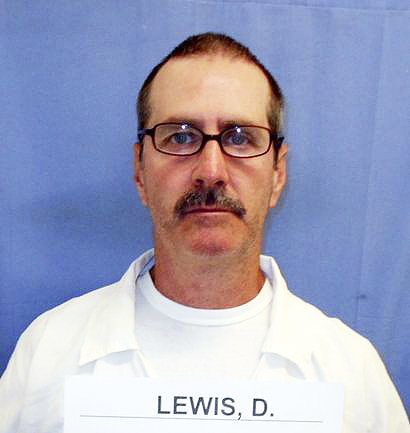FAYETTEVILLE -- A Washington County judge ordered the release of a teen killer sentenced to life in prison for a murder committed in Springdale more than 40 years ago.
Dennis Wayne Lewis, 59, of Wichita, Kan., was convicted of capital murder and assault with intent to rob. He was sentenced to life in prison without the possibility of parole.
Supreme Court ruling prompted resentencings
On Jan. 25 a divided U.S. Supreme Court said an earlier ruling that struck down automatic life terms with no chance of parole for teen murderers should be applied retroactively. The ruling means inmates convicted years ago must be considered for parole or given a new sentence. The court’s ruling came in the case of Henry Montgomery, who has been in prison since 1963 for killing a sheriff’s deputy in Baton Rouge, La. Montgomery was 17 at the time. The decision doesn’t bar judges from sentencing teen killers to life in prison, but the court has said life sentences for teens should be rare, and only used in the worst cases. The court’s ruling could affect more than 1,000 prison inmates across the country who were involved in murders while they were teens. Some of those inmates have been behind bars more than 50 years. In June, Lincoln County Circuit Judge Jodi Raines Dennis vacated the sentences of 56 inmates in Arkansas who were minors when they were sentenced to life without parole.
Source: Staff report
Lewis was 17 years and 5 months old when he killed Jared Jerome Cobb at Cobb's Western Store and Pawn Shop during an armed robbery April 8, 1974.
Circuit Judge Mark Lindsay signed an order Tuesday that Lewis' sentence remain vacated and he be immediately discharged from the Arkansas Department of Correction.
Lewis' case is unusual among the 56 Arkansas cases in which juvenile life sentences have been vacated, according to his attorneys, L. Gray Dellinger and Larry Kissee. They maintained because state statutes were overturned, no constitutional sentencing options are available to the court based on state law at the time Lewis committed his crime.
Matt Durrett, Washington County prosecutor, said Tuesday he and others, including the state Attorney General's Office studied the issue over the past several weeks and, reluctantly, came to the conclusion Lewis' lawyers were correct.
"It's frustrating with all these cases that they were decided so long ago and all these families have had so much time to put this behind them and, all of a sudden, here it comes again. It comes bubbling back up to the top," Durrett said. "They had their appeals and they think I'm never going to have to worry about this guy getting out of prison again and, lo and behold, 40 years later you get a court saying we think the law should be different now. So, they change it and you're left with families having to relive this."
Dellinger said he was expecting Lewis' brother to pick him up Tuesday at the Washington County Detention Center and take him to Kansas to live.
"We're happy, it's been a long journey. I don't know what his future holds," Dellinger said. "I really feel badly for the victim's family and I'm sure Dennis wishes he could undo what he did."
Dellinger said Lewis' crime came just before the laws were changed.
"We were right," Dellinger said. "It's just a quirk in the law. I think he's about the only one that will apply to. They amended the statute in 1975."
Recent state and federal appeals court rulings have said mandatory life without parole sentences for juveniles are unconstitutional cruel and unusual punishment. Teens should at least have the hope of someday being released, according to the rulings, which are retroactive.
Prosecutors sought the death penalty against Lewis, who had a prior armed robbery conviction in Kansas. Lewis was convicted of capital felony murder in January 1975, according to the motion. Sentencing was based on a 1973 state law that provided for a person convicted of capital felony murder to be punished either by death by electrocution or life in prison without the possibility of parole. There was no option for a term of years.
The motion seeking his release argued any sentence Lewis may be given today must be in accordance with the state statute in effect at the time the crime was committed. The 1973 law offered only life without parole or death. The law was changed in 1975, effective Jan. 1, 1976, to provide for a sentence of 10-40 years or life, but that law isn't applicable because it was after the fact, according to the motion.
Lewis wore a dark brown wig into the store and shot Cobb in the chest with a .22-caliber pistol before cutting the telephone line and taking six .22-caliber pistols. A customer found Cobb's body several minutes later. Cobb had $1,000 in his pocket and the cash register hadn't been disturbed.
Lewis threw the murder weapon into Lake Fayetteville, and the stolen guns and a pair of gloves were found on the grounds of the Springdale Country Club. Two off-duty Springdale police officers caught Lewis about three blocks from the store at Lake Fayetteville Park some 30 minutes after the killing. Lewis surrendered after one of the officers fired a shotgun round over his head.
Lewis had been held at the Department of Correction's Cummins Unit at Grady in Lincoln County. He is one of three men spending life in prison for murders they committed in Washington County as teens.
The other two men are James Dean Vancleave, 54, of Springdale, who was convicted of capital murder in 1978, and Christopher S. Segerstrom, 45, of Fayetteville, who was convicted of capital murder in 1986.
There are no similar cases in Benton or Madison counties.
NW News on 10/26/2016

